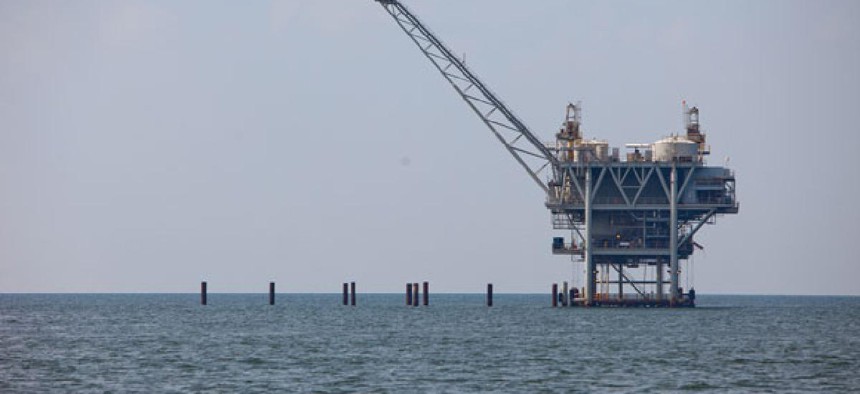
A rig extracts crude oil from the Gulf of Mexico in 2010. Flickr user kk
Isaac prompts loan from petroleum reserve
The Energy Department has loaned oil in similar, emergency-type situations eight previous times.
The Obama administration is loaning 1 million barrels of oil to Marathon Petroleum in the wake of Hurricane Isaac, the Energy Department announced on Friday.
The oil loan, which will come out of the nation’s Strategic Petroleum Reserve, is not the same thing as an official release of oil from the 727 million-barrel SPR, an action that would have political, economic, and foreign-policy implications.
“Today’s announcement is part of the broader federal effort to respond to those impacted by Hurricane Isaac,” Energy Secretary Steven Chu said in a statement. “This emergency loan from the Strategic Petroleum Reserve will help ensure Marathon’s refining operations have the crude oil they need to continue operating.” Marathon will return the same quantity of oil to the reserve in the next three months.
The Energy Department has loaned oil in similar, emergency-type situations eight previous times, most recently following Hurricane Gustav in 2008, the department said.
The Interior Department said on Thursday that because of Hurricane Isaac, almost 95 percent of all the daily oil production in the Gulf of Mexico—which accounts for about a quarter of all U.S. oil production—was halted. Almost three-quarters of all natural-gas production was stopped as well.
Oil prices have not gone up much as a result of Isaac yet. In fact, a highly anticipated speech by Federal Reserve Chairman Ben Bernanke on Friday morning about the economy has affected oil prices just as much, if not more, than Isaac. Analysts predict that there won’t be any long-term price impact because of the storm.
This is due in part to the fact that most oil companies had evacuated and stopped production well before the storm entered the Gulf of Mexico, so it eased traders’ concerns that there would be long-term infrastructure damage and lengthy production delays, problems that caused then-President George W. Bush to tap the SPR following the historic 2005 hurricanes Katrina and Rita.
Rumors about whether the Obama administration will work with other countries and the International Energy Agency to conduct a coordinated release from the SPR continue. But White House spokesman Jay Carney continues to offer no insight except for the notion that all options are on the table.






